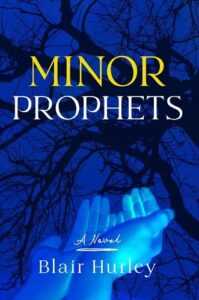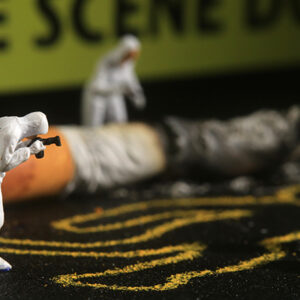Novels, I’ve found in my writing experience, come out of ideas that won’t be denied. They surface from the mind like something primeval climbing out of muck. Once they’re out there, wet and dripping, there’s no putting them back under the black tar. My novel about an apocalyptic cult, Minor Prophets, came out of me that way, a piece at a time, first a head, then a tail, then a confused monstrosity of parts.
I had just moved to Chicago after a lifetime spent on the east coast. One rainy night the first week my husband and I arrived, lost in our new city, carrying shopping bags of home goods back from a Target on the Near North Side, we passed a grassy field, a square of wild unkempt emptiness with no place in the middle of a city. In the middle of the field, a small white church, leaning and ramshackle, its classic black steeple stabbing into the night sky, forbidding and haunted and strange. FOR SALE, the sign read. CHURCH. We were lost, and this church stood, a ruined beacon, dubious sanctuary. Here is the novel, though I didn’t know it yet. Here was the American story that would suck me in, obsess me, haunt me, endanger me. Every novel is a dangerous seduction for its writer.
I’m a writer who has always been fascinated by the dark side of religious institutions, about women and power and spirituality, about the transcendence of spiritual experience mixed with doubt, abuse, and dread.
As I wrote Minor Prophets, I tried to penetrate the darkness at the heart of religious extremism, the frightening tenderness in its sweet core of belief. There’s something so appealing, so relatable, about a cult member’s search for transcendence and immortality. And there’s a fine line between that quest and total destruction. I’m as susceptible as anyone else. Lonely in a new city, missing my mother, who died several years before of cancer, but went to college in Chicago, I felt occasionally like I was touching secret, sacred places from her life. I walked by the lake and wandered up and down the city’s broad, wind-blasted avenues, wondering where she might have visited. I was still struggling to understand how it could be possible that she was gone, how the world could keep turning in such an unimaginable aftermath. I did not know who I was without her.
Another moment that lurched out of the muck:: I was flipping through tv channels late at night and stumbled across a reality survival show. Can you last in the wilderness of Alaska? A team of newcomers with minimal survival training is set loose in the interior. They’ve been hunting, and have made their first kill, but it’s a porcupine, and the novice survivalists are at a loss, unsure of how to cut it open. Finally, they do, and the guts — all those warm pulsing parts of the animal who was alive just moments ago — bulge out. Someone cuts out the bladder and holds it up. It’s full, and glowing yellow with the light behind it. Something odd and organic and real, saintly and soiled at once. I didn’t know what it meant, but II was electrified by this vision of life and death in its brutal, biological reality.
In my novel, a girl skins a porcupine in the first chapter. And then she walks into the kitchen, where her mother is assisting another woman with a secret abortion. Life and death, its fine bloody line.
In those years in Chicago, I listened to Glynn Washington’s excellent podcast on the Heaven’s Gate cult (called Heaven’s Gate). With well-researched, unsensational detail, he builds the story of this doomed group and their ultimate destination, a mass suicide in a rented mansion in San Diego. An excellent storyteller, Washington takes the time to linger on the odd little details: their fondness for Star Trek (one member writes “39 to beam up” in their signout book), their matching unisex bowl cuts, the almost tender way each member is paired with another and served a spoonful of apple sauce laced with phenobarbitol. Cults, I’ve learned, have a uniquely American history. While they’ve popped up around the world, no other country or culture has produced so many new and fringe religions in contemporary history. There are the Mormons, the Spiritualists, the survivalists and preppers: Manson’s Family and David Koresh’s Branch Davidians, Jim Jones’ Temple and Stephen Gaskin’s Farm. In my novel, the protagonist surfs through online support groups for survivors of cults like these, learning how much they had in common: thought control, coercive sex, child marriage, anti-abortion dogma, the promise of death a poisoned drink away.
American culture has always been open to the idea of re-invention; the authority and tradition of top-down religion has been rejected by so many, but then there’s a void left to fill.American culture has always been open to the idea of re-invention; the authority and tradition of top-down religion has been rejected by so many, but then there’s a void left to fill. New Age and fundamentalist Christian cults are eerily similar in their conservatism, how they police the body and promise liberation in the same breath. Heaven’s Gate banned sex and many of its members castrated themselves. The Farm banned birth control. Koresh’s Branch Davidians were strictly celibate except for its leader, who married any girl his God told him to marry. I read books and listened to radio shows about them all, taking notes, telling anyone who would listen the most disturbing things I learned. What was the common link, the toxic thread? If I could just find it, I thought, I’d know what story I needed to tell.
I can see how it was becoming an obsession. Maybe for novelists, each book is its own cult religion.
I looked up the original farewell videos of the Heaven’s Gate members on Youtube. These macabre documents are nineties-style suicide notes, filmed on stuttering VHS tapes. The members of the cult come on in pairs, sitting in plastic lawn chairs against a verdant green garden. They laugh sheepishly, they refer to their own bodies as “their vehicles.” They have learned to view themselves as beings of spirit and air, completely separate from these bodies that in a matter of hours, they will shed. The videos are cheesy, like old home movies, and they’re terrifying. I’m finding that cults share a nearly inevitable slide toward end-of-the-world thinking. Most cults don’t begin with thought police, isolation, mass death. They’re subtle, they tell a compelling story that we can’t turn away from. They start with a flyer in a community center basement, a blocky web 1.0 site, a mysterious, provocative, charismatic leader. The leader promises many things: focus and beauty and the hidden secrets of the bible. A secret way to connect with a higher truth. TLiving a life without B.S., giving yourselfto a true and pure principle. If the message comes at a crisis point in someone’s life, then that person is vulnerable. If we’re lonely, if we’re hurting, if we’ve always longed for some greater sense of connection and belonging, we are vulnerable. It can take over the lives of rocket scientists and philosophers and PhD’s. Education is not always protective; I’m surprised to learn in my research that engineers and mathematicians are particularly prone to falling for end-of-the-world ideologies, perhaps because they like solving puzzles and cracking codes, and they believe they can understand secret knowledge that others cannot. Isaac Newton spent the last decades of his life consumed with the idea that he could calculate the end times by studying the Bible. Genius can lead us down rabbit holes. Cultlike thinking is something that can enter anyone’s life, depending on the time, the place, the circumstances. It can spread like a whisper in your ear, or a disease. It can promise you that there’s a special place where you belong when you feel alone in your grief, or offer the tantalizing promise that death is not the permanent blank wall you thought it was. I can see, now, why I had to write this story. Why faith of any kind can offer such seductive comfort if you’re grieving.
It’s 2015, then 2016, the height of election season. My husband and I take road trips north to Michigan’s remote Upper Peninsula to hike in the woods. As we head out of Chicago and travel deeper into rural farmland, the Trump signs in yards, leaning against old barns or jutting proudly out into the road, grow larger and larger, looming in our vision. They seem ominous, a whiff of doom in the air. I’m discovering, along with many Americans, that there is more than one country, more than one narrative of American life. For urban dwellers like me, the election results are a rude awakening: there is a dark vein of extremism that has always been there as part of our shared story, and now it’s rising.
In my novel, a girl grows up in a militant, apocalyptic organization in the woods of Michigan’s Upper Peninsula. Her father, the cult leader, has fashioned her into a prophet for the group, and she, needing his love and acceptance, performs and prophesies. But while many cult novels focus on the simplistic explanation of “brainwashing”, I wanted to understand what makes believers fall in love. If I was going to write this novel truly and honestly, I couldn’t come at it from a position of contempt. I needed to imagine my way into a room full of praying people, into the body of a child speaking in tongues. I had to acknowledge the ecstasy and beauty of belonging. My girl protagonist is a victim of her father’s manipulations, but she’s also a recruiter, a manipulator all her own. If she’s going to escape this world, she will have to grapple with her own complicity.
For most of a year I watched my mother die, and I saw the tender, focused care she received from her hospice nurses. These men and women came to our house nearly every day, listening to her needs and working to make her last weeks and months meaningful. While watching them care for her, I begin to learn that hospice care is about radically re-envisioning the goals of medicine. A good hospice caretaker must step into the terrifying moment of after: after a diagnosis is terminal, after it feels like the doctors have given up on you, after the goals of cure are no longer a possibility. Instead, a good hospice nurse navigates the search for new meaning: to dig value out of every day, after a personal apocalypse has occurred.
in so many of the cults I’ve studied, it is women’s bodies that are the battlefields upon which wars are waged.In the present-day storyline of my novel, the girl protagonist is working as a hospice nurse in Chicago, navigating her messy escape from the cult and struggling to live in the outside world. Part of her journey is with her dying patients, witnessing the very private journey they must go on. The end of the world, as it turns out, is a personal experience, not only a global one. We all have our personal apocalypse to journey through. And for the living left behind, it’s a question of figuring out how to live in the aftermath.
That was the critical final piece of my novel: I realized I was writing about what happened when the world you’d been planning for didn’t materialize. What happens when the world doesn’t end, and you must go on, feeling your way through one day and the next?
When my mother died, our usual hospice nurse was not available. Instead, a stranger came to our house, did not remove her sneakers, marched up to the bedroom and checked my mother’s pulse. “Oh yes. She’s in heaven now,” she declared. I felt a wild surge of anger: my mother was resolutely non-religious, and never used language about heaven, God, or angels. This pronouncement, this promise made, felt like a lie, told in the silence left behind her passing.
I can still taste the anger of that moment, now more than ten years ago. And that’s another element of Minor Prophets, the missing piece of my obsession: that in so many of the cults I’ve studied, it is women’s bodies that are the battlefields upon which wars are waged. They’re the weapons, the tools, endlessly manipulated and coerced, nearly always silent in the stories that emerge in the aftermath. Their untold stories flash across my brain: women in long dresses, holding children, peering into the cameras of outsiders with wariness of wild animals; women presented with impossible choices; girls told to worship, girls told to obey, girls denied the interpretation of their own story; women alone in rooms with powerful men; women searching for some kind of revelation, wanting their own transcendence. Women looking hopefully upward, seeking a god, finding only a human face staring back.
***


















